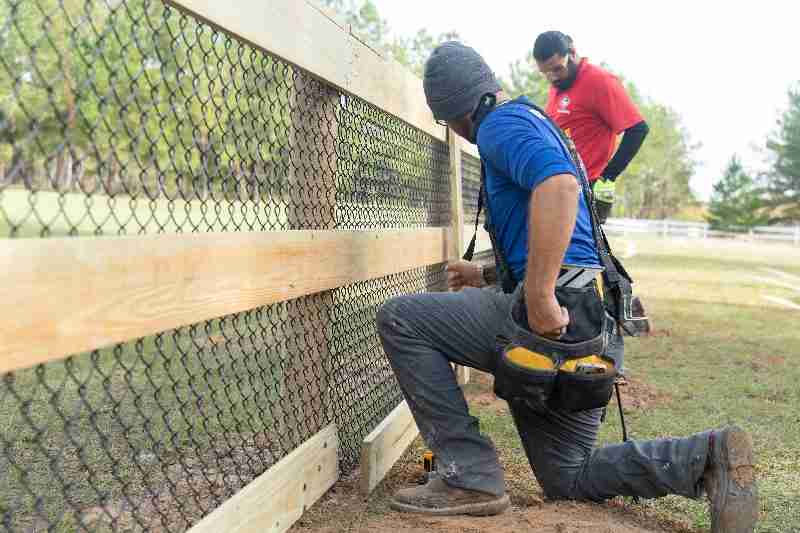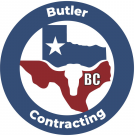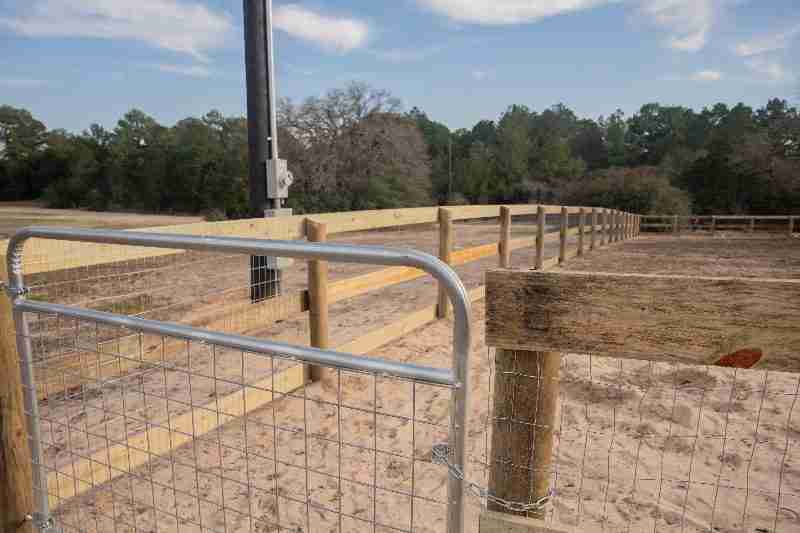If you have decided to take on the task of fencing in goats, then you are probably aware of their behavior and incessant need to explore and challenge the fence you erect regardless of height or material. Choosing the wrong fence can lead to several escapes or worse, a goat getting stuck, leaving it as prey for local predators. The following options will provide you with enough information on what fence options are best for goats to keep them close to home and safe from the animals that would like to have them for dinner.
Area of Goat Pasture
The amount of space you have for your goats will determine just how much fence you need. If you plan on covering a larger area, then your choice of fence may come down to cost and not so much absolute security.
Goats are herd animals and you should have at least two if any at all. If you only have one, it will be far more likely to get bored and try to make an escape. A good rule of thumb is to have 250 square feet of space per goat, but the more space you have available for your goats, the happier they will be.
Height of Goat Fence
The necessary height of the fence can depend on the breed of goat, but a safe height to shoot for is 5 feet high.
Electric, Non-Electric or Both
A good way to get your goats to respect the fence line is to electrify it. Electric fence material is one of the more affordable options, but it can prove unreliable under certain circumstances. If you have grass that grows too tall or tree branches that reach down to touch the fence, it can ground out the circuit and your goats won’t get a shock delivered to them should they rub up against the fence. This will require you to regularly walk the fence line and make sure that it is clear of any debris that might ground it out. The other condition is dry soil. If the soil is too dry, the current won’t conduct to your goat. If this is a common issue in your climate, then perhaps you should forego the electric idea altogether.
High-tensile hot wire fencing is a good option for electric fences. The number of strands required can vary depending on how high you want the fence and how much space you can have in between strands. If you have younger kids, you will need more strands to keep them from escaping.
Another consideration is that goats will require a bit of training with electric fences before they respect the boundary.
If you’re considering an electric fence, you’ll need to purchase a charger, which will be the more expensive part of the fence. The fence should be charged at 4500 to 9000 volts.
The nice thing about electric fences is that they can be combined with other fence structures to provide more security and a nicer aesthetic.
Wood
If you would like a wood fence, it’s best to go with a stockade style rather than a picket style that has gaps. Goats can get their limbs caught in between the pickets and hurt themselves. Some people have had success using pallets to build goat fences, however, sourcing the pallets may be difficult and they aren’t the nicest looking. Moreover, goats tend to enjoy biting and chewing on wood, this may factor into your consideration.
Welded Wire
Welded wire and woven wire fences work well to keep in goats, however, with any type of mesh fencing, the openings should be no larger than a 4” x 4” space. There are fences that are 6” x 6”, which will be cheaper, but they can be very harmful to goats. They will poke their heads through the holes and possibly get stuck. If your goats have horns, they will absolutely get stuck, rendering them defenseless. If you have baby goats, you might want to size down even further to the 2” x 6” to be on the safe side. Just remember that the smaller the mesh sizes are, the more expensive the fence material will be.
Chain Link
Chain link works great! It’s durable, reliable, long-lasting and requires very little maintenance. It may not have an appealing look for your tastes and can be on the more expensive side of fences, but it is a solid option for fencing in your goats.
Mina Style Fence

We at Butler Contracting created a fence that combines wood and mesh fencing that is long lasting and will stand up to your goats rubbing up against it to get a good scratch.
Mina Fence Features Include:
5-inch treated round posts that are more durable than 4x4s that warp, bow, and crack and are more aesthetic than metal posts.
3 rows of true 1-inch thick treated boards with an optional top cap placed horizontally for less warping and durability standing up to weather, animals, and gravity.
-American-made galvanized and black vinyl-coated chain link steel with a 12-year manufacturer warranty.
This fence can also be built with welded wire instead of the chain link if you so desire.
Goat Gates
When installing a gate for goats, make sure that the gate swings inward and is restricted from swinging outward. This makes it difficult for the goats to push the gate open should someone forget to latch it. If you move your goats often from one area to another, consider installing 2 gates, one for the goats and one for only humans.
Play Structures
Goats love to play, climb, and jump and always have a fascination with standing on structures. You can include play structures in their pasture area, but be sure that the structures are at least 5 feet away from the fence line to discourage them from trying to jump over it.
Butler Contracting Builds Fences!
There’s a lot to building a fence and it can get overwhelming with so many details. We can help you with all of those details and make sure that the fence gets installed correctly. Give us a call at (844) 628-8537 or use our Fence Estimator Tool to get us started on your quote.



